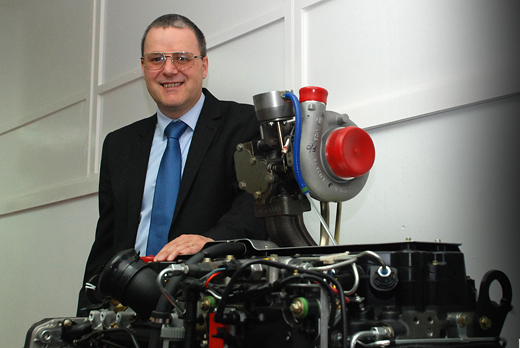Uni’s industrial backing for new Turbocharger Research Institute
 Professor John Allport is to lead the new Turbocharger Research Institute which will be the UK’s only university research group that specialises in turbocharging
Professor John Allport is to lead the new Turbocharger Research Institute which will be the UK’s only university research group that specialises in turbocharging
Mon, 12 May 2014 12:33:00 BST
Huddersfield launches the UK’s only university research group that specialises in turbocharging
TURBOCHARGER technology is powering ahead and a major new research centre at the University of Huddersfield will play a key role. Headed by a professor who has decades of industrial experience, it will focus on the real-world applications of turbochargers, which are increasingly crucial to fuel efficiency and pollution control.
John Allport has been appointed Professor of Automotive Engineering at Huddersfield, which is now home to the UK’s only university research group that specialises in turbocharging. Initially, it will be based in specially-adapted labs, but plans are being made for the construction of an all-new research centre on a site newly-acquired by the University that once housed a local engineering firm.
“There are groups at other universities that look at turbo machinery, but not the application side of it. We are focussed on what happens to the turbo machine when you actually use it in the real world,” said Professor Allport.
 He heads the University of Huddersfield Turbocharger Research Institute (TRI), officially launched at the International Conference on Turbochargers and Turbocharging organised by the Institution of Mechanical Engineers at the British Museum on 13th and 14th May.
He heads the University of Huddersfield Turbocharger Research Institute (TRI), officially launched at the International Conference on Turbochargers and Turbocharging organised by the Institution of Mechanical Engineers at the British Museum on 13th and 14th May.
The TRI offers an MSc degree – with places for 25 students – that is specifically designed for people working in industry.
The Institute has received important backing from the multi-national engineering firm BorgWarner – which has a plant in Bradford – as part of a Regional Growth Fund backed project. The TRI also has links with other leading firms in the field.
From industry to academia
Professor Allport’s career began with a National Coal Board Student Apprenticeship, before changing industry to work on high-speed rotating machinery and the problems associated with engine vibration. His employers included the Halifax firm Holset, which was later acquired by Cummins.
It was while working in industry that Professor Allport branched out into academic research, including PhD study at Bradford University that was funded by the Royal 1851 Commission. He began to supervise doctoral students himself, leading to his appointment as Honorary Visiting Professor at Bradford, but was still based at Cummins when he was recruited by the University of Huddersfield to lead the new Turbocharger Research Institute.
Professor Allport said that turbocharger technology remained relatively static for decades until it began to develop exponentially in the 1980s, in the wake of episodes such as the 1970s fuel crisis. Initially, turbos were associated with power and performance, but nowadays the emphasis is on emissions and pollution control.
“You cannot meet the current emissions legislation without turbocharging. It is an essential part of engine efficiency now,” said Professor Allport, pointing to the fact that today’s turbocharged 1.6 litre Formula One engines develop more power than 3-litre engines did a decade ago.
The vast majority of lorries and large proportion of cars are now turbo-equipped. Many vehicles now have multiple turbos.
“It is not the efficiency of a single turbocharger that is the issue any more. It is how that turbocharger works with one or possibly two others in a system. A lot of our research will be based around this interaction,” said Professor Allport.







